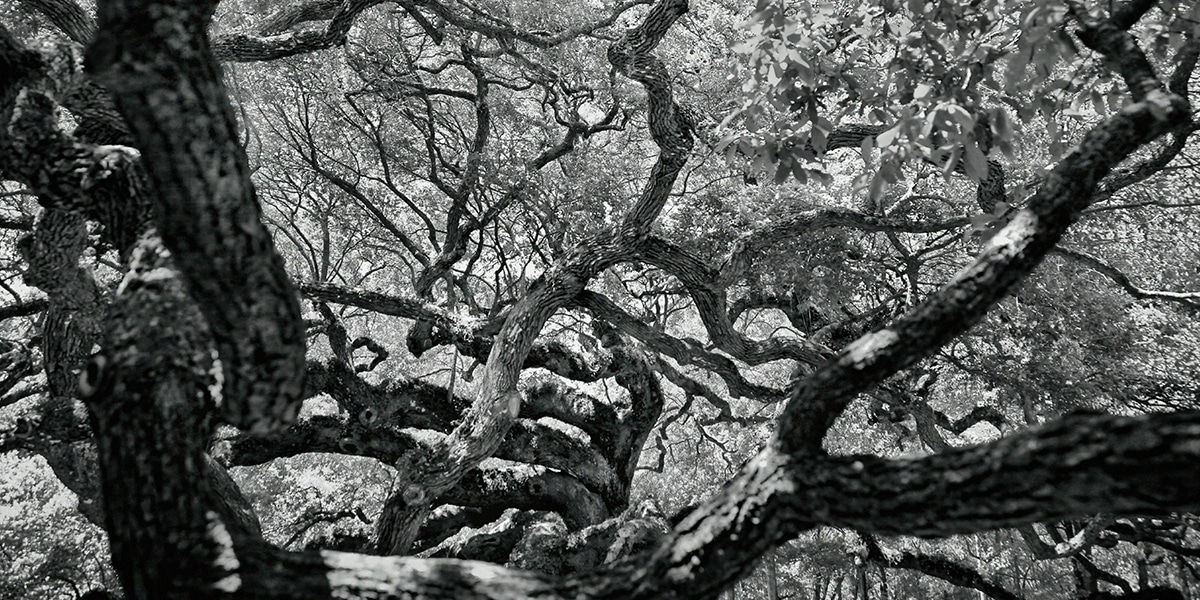The loss of a live oak leads to a new conception of the seven lively virtues.
Pope Francis’ encyclical Laudato Si’—like the poem by St. Francis on which it is based—speaks of the fragility of our ecology due in large part to the weakness of our morality. Unless we value each creature as integral to our humanity, we cannot act as responsible stewards of a global community.
As a Franciscan working with undergraduates, I was pondering the significance of the pope’s words for my ministry when an old friend died: a southern oak, older than anyone on campus. Students called this majestic tree the “smoking oak,” because it was where they were allowed to light up. But I thought of it as smoking because, at every dawn, it was a billowing, black silhouette against a horizon glowing like a firestorm. It was my faithful friend, next to whom I prayed every dawn in any weather.
But now it had perished and was being hacked by chain saws before being hauled away to the school’s annual bonfire. When the creaking and chain sawing began, I wanted to flee somewhere quiet where it would be easier to pray. But my love and admiration for this paradigm of perseverance overcame me. How tragic if such a great life would die alone and unlamented. Nothing so strong and faithful should die with no one at its side. So I stayed to grieve the tree, standing watch to pray that our ancient champion would pass gently, and suddenly death invited me to reflect intently.
In death, this live oak became a micro metaphor for the global reach of Laudato Si’, which states: “Consequently, we can ascend from created things ‘to the greatness of God and to his loving mercy’” (#77). If creation is a book of revelation, then meditation on nature may lead us to a deeper appreciation and understanding of the nature of God’s mercy. Thus, even before our oak burned in a bonfire, it fueled my contemplation upon the seven lively virtues, which I share here with readers as I have preached to our undergraduates. Like our oak tree, each virtue demonstrates the nature of God’s mercy: We become merciful only by receiving the mercy of God.
Humility. While I seek recognition, our oak was taken for granted for so long that it seemed a permanent feature of the landscape, like a hill or a lake. Humility comes from the Latin word for dirt. Would that I were as firmly planted in humility as the tree was in the humble earth, but too often my pride drives me to desire acknowledgment and appreciation for my actions. I pray through God’s mercy to become as unpretentious as an acorn.
Generosity. Our oak’s outstretched boughs bestowed endless benediction. Its leaves held countless confidential conversations and it witnessed many pets, prayers, and parties. The roots were deep because it had many memories to share. Compared to the tree, my generosity is but a small twig. I do not open my arms, my heart, my wallet, or my time like our oak—abundantly and without exception—welcomed any passerby. Thus, I pray through God’s mercy to sink my roots deeply into the same rich liberality whose bounty was our oak’s beauty.
Meekness. The oaken wood had withstood hurricane and drought, pests and plagues. I’m not even meek and patient when the tater tots are cold, much less when my own compulsions become pests or the moods of family members seem as changeable as the weather. The oak did not approve of evil, yet endured it. I, however, sway like a sapling in the wind, blown about by my anger at adversity. Therefore, I pray through God’s mercy for the docility of those slender sprouts of spring that turn all things to the good of those who serve their Creator.
Zeal. Our oak exuded life. In its branches birds nested, in its shade we rested, upon its bark lichen and moss contested. Our oak was so exuberant with life that mites munched its marrow. There was nothing slothful about our noble guardian, which surrendered its body so others might live. I, however, stem exuberance, quiver like a twig before fanaticism, and easily branch into apathy. I pray God’s mercy makes me passionate about giving life to others even when I’m tired to death.
Solicitude. Our oak envied no one, begrudged nothing. It admired birds, but was content not to fly. It welcomed prattling squirrels, but was happy with its own silence. Solicitude is the ability to assume the good about others and rejoice in their fine fortunes. In a political season during which rancor reigns and debating opinions degenerate into debasing opponents, I resolve to show solicitude. I will not truncate compliments to students nor appreciation for our maintenance workers, the kitchen staff, and secretaries. Like our tree, I will reflect the true nature of God’s mercy.
Temperance. During all its long life, our live oak never took more than it needed. It never gorged itself on water or gobbled more nutrients than it required. What would the world’s environment be like today if the human race had been as temperate as oaks rather than as gluttonous as ogres? Every sin against creation is a sin against the Creator. Consequently, I pray through God’s mercy that upon my death I can sincerely say that, like our oak, the earth was more enriched than depleted by my life. What a crowning canopy!
Chastity. What can an old oak teach the young people on our campus about chastity? Channeling the sap of life through chastity rather than rebelling against self-mastery is exactly what Pope Francis means by “fertile chastity”—that is, the begetting of spiritual children just as the Virgin Mary did.
Praise God, Always
Who knows more about such fertile chastity than our ancient oak? It fed a forest! It was a live oak and it was alive not with a craving to consume, but with a desire to donate. I recall every sparking sunrise made holy as my spirit struggled upward, while our live oak’s branches soared heavenward, straining like me to ignite with the object of its desire: the sun afire. While in this life, our oak could never reach the heights of its fiery desire. Live wood cannot combust.
Like Christ, who died upon another tree, our oak had to expire in order to inspire. Through its death by bonfire, our oak was resurrected as spirals of sparks billowing from its oaken heart to rise higher and higher.
Death ignited the oak to brightly proclaim that we, too, must serve as fuel for the Spirit, burning like wood to its flame. Laudato Si’—praise God’s majesty in creation and in crucifixion! Laudato Si’—praise God for the earth from which burst the Resurrection! Laudato Si’—praise and bless and thank the Lord for the nature of God’s mercy.









1 thought on “A Revelation on Creation”
I am speechless as the words of this Minute Meditation touch my heart.